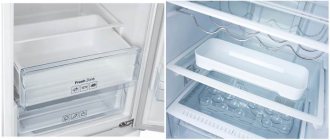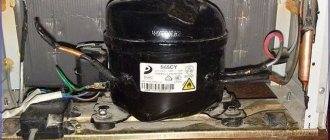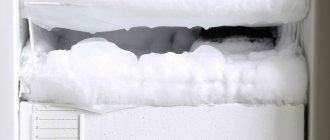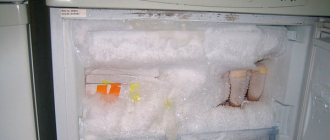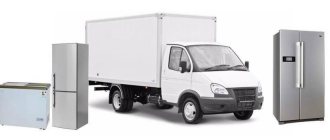Timely defrosting of the refrigerator is an important condition for the uninterrupted operation of the unit, the safety of food and the elimination of unwanted odors.
But not all users know that it is necessary not only to defrost the refrigerator correctly, but also to turn it on correctly. We will tell you about all the intricacies of the process and possible problems with the operation of the device in this article.
A little theory about modern refrigeration technologies
Modern refrigerators, which, according to manufacturers, do not need to be defrosted at all, operate on the same principle.
- Inside the refrigerator, a small fan rotates constantly to ensure uniform cooling of all the air inside the refrigerator. Frost from moist air that enters the unit every time the door is opened does not form over the entire surface of the wall, but only in a few limited places. While the compressor is idle, this frost has time to melt. The water flows into a special tray above the compressor. As soon as it starts working, the heat generated causes the water to evaporate. This is how frost constantly disappears from the refrigerator. And the technology for permanently removing it is called no frost;
- It turned out that the price for constantly removing frost (frost) is increased noise and energy consumption of the refrigerator (the fan is constantly spinning!). Therefore, they learned to ventilate the freezer compartment statically, without using ventilation. Forced ventilation remained only in the freezer to get rid of frost (frost). This development of no frost technology is called frost free.
Why is this procedure needed?
The refrigerator needs periodic defrosting for three reasons:
- to clean the cells from dirt, mold, unpleasant odors and to audit the contents of the cells;
- for more correct operation of temperature sensors, the operation of which can be disrupted due to a large layer of ice;
- for comfortable operation of equipment - easy opening of doors, drawers, better access to compartments freed from frost.
How often?
The opinions of experts in terms of the frequency of defrosting differ in many respects. Some experts claim that devices operating on the basis of the No Frost system do not need defrosting at all.
Others argue that it is necessary to defrost refrigerators no more than once a year, since due to sudden temperature changes, parts of the device can quickly fail.
Important! According to hygiene standards, the refrigerator is defrosted once every 6 months - that is, twice a year. This frequency will be enough to maintain the functionality at the proper level and promptly clean the cameras from bacteria and dirt.
Old Soviet-made units, prone to the formation of a large layer of ice, will have to be defrosted more often - every 3-4 months.
Do I need to defrost the No Frost system?
introduced into modern devices also involves periodic defrosting .
The chambers should be cleared of frost at least once a year, but not more often than every 6 months. The recommended defrosting duration is 12-24 free defrosts.
One of the varieties of the “no frost” system is drip-type refrigerators . They require defrosting once a year, and some models are even equipped with a built-in warning system that will signal the need to remove ice.
Read about how to defrost a Samsung No Frost refrigerator here. Find out also how to defrost a Stinol two-chamber refrigerator.
How to properly turn on the refrigerator after defrosting it?
After all procedures are completed, you need to turn on the device correctly. Regardless of how long it has been defrosted, several manipulations must be performed sequentially. First, we collect all the water from the shelves and floor. If this is not done, a short circuit may occur. When all surfaces are dry, you can plug in the refrigerator. Only after it has stood for a while and the temperature in it has dropped to the desired level should food be loaded into the chamber. By doing this earlier, you can provoke their damage.
Defrosting the refrigerator is a mandatory procedure, but it should not be abused. Too frequent temperature changes can cause even more problems than failure to turn off the device. One application per year is usually sufficient to keep the installation in optimal condition.
All. Not only Soviet ones, which are covered with a multi-centimeter snow coat and require manual defrosting.
How to get rid of fruit midges in an apartment: effective ways and methodsHow to clean the oven from grease and carbon deposits: tips and more effective methods
What to do if your kitchen sink is clogged: how to clear the clog yourself
Of course, they are equipped with a drip defrosting system or a No Frost system. And yet sometimes they need to be turned off, freed from frost or ice and washed.
Useful video
General defrosting and cleaning of the refrigerator:
Just a few years ago, any housewife should have known how to defrost a refrigerator in order to properly clean it from thick ice deposits. Modern devices are no longer so susceptible to icing, but they also require specific care. They don’t need to be defrosted as often as before, and you don’t have to worry about unpleasant consequences in the form of huge puddles on the floor. But you still have to adhere to certain rules if you don’t want to reduce the functionality of the device or increase the amount of energy it consumes.
How do the operating characteristics of the device affect the frequency?
The frequency of defrosting directly depends on the thickness of the ice layer in the chamber. In turn, the rate of ice formation will depend on the characteristics of use of the device by family members.
Reference! The minimum layer of frost in a refrigerator to be defrosted is 0.5 cm.
What is meant by features:
- storing liquid food and drinks without lids - evaporating moisture contributes to the rapid formation of ice;
- frequent opening/closing of the door - warm air enters the chamber, which, when cooled, forms condensation that settles on the walls of the case;
- condition of the rubber seals - improper washing, wear or stretching of the seals violates the tightness of the refrigerator and provokes the formation of a large amount of frost.
The influence of one or more factors leads to the fact that the refrigerator will have to be defrosted more often than expected - as soon as the layer of frost reaches a critical level.
Temperature adjustment
Most modern refrigerators are equipped with electric regulators and temperature modes in the Atlant refrigerator are switched using buttons installed on the facade of the refrigerator and an LCD screen. But there are also models on sale that are equipped with a graduated wheel.
Two-chamber refrigerator models operating on one compressor do not have the ability to adjust the temperature in both chambers separately. Only a general decrease or increase in temperature is possible.
In two-compressor refrigerators, the temperature mode is set by an electrical control button. Usually there is a screen installed on the facade that shows the temperature in the chambers. The mode can be changed by pressing the “+” and “-“ buttons.
Temperature controllers and indicators
In modern refrigerators, you can adjust the temperature from -3 degrees to -18 in the freezer. If you have electric adjustment, this is quite easy to do. In addition, there are a number of additional functions in the form of quick freezing or cooling of food placed in the refrigerator compartments. However, even on older models equipped only with a graduated ring, creating a comfortable temperature is not difficult. Do not set the temperature above that specified in the instructions, otherwise the refrigerator may lose its quality and its service life will be reduced.
Regardless of whether the refrigerator is double-chambered or not, whether it has an automatic defrosting function, whether it is filled with food or half-empty, household appliances need to be defrosted. To do this, you need to unplug it, remove all contents and wait until it completely thaws. But before you turn on the Atlant, or any other, refrigerator after defrosting, you should properly prepare it.
General characteristics
All Soft Line refrigerators have a bottom freezer compartment. The volume of the MK varies from 100 to 154 liters, the volume of the refrigerating chamber - from 187 to 252 liters. Height from 176 cm to 205 cm. Width 60 cm, depth 63 cm.
Type of control used in the series models: electronic, electronic-mechanical. Defrosting is possible by drip, in the freezer manually or NoFrost. Manual defrosting is carried out once a year.
There are 4 indicators on the top door panel that help control the operation of the refrigerator: green indicates the camera is on; red – about an increase in temperature in the chamber; yellow - about freezing.
The video shows a description of the refrigerator:
The control panel contains:
switch;
- MK thermostat roller;
- thermostat roller ХК;
- MK power indicator;
- HC inclusions;
- indicator of temperature increase in cold room;
- freezing indicator in MK.
You will also be interested in learning more about how to install a narrow 40 cm dishwasher.
General functions of SoftLine series refrigerators:
- quick freezing of large volumes of food (12-15 kg);
- a sound signal notifying about an open door for more than 30 seconds.
The storage chamber volume is divided into temperature zones for storing different types of products and has appropriate shelves and devices for their placement. The temperature in the storage room is set manually and maintained automatically. The thermostat has a gradation of 8 divisions: 1 – the highest temperature, 8 – the lowest.
The temperature regime depends on the fullness of the volume: the greater the number of products, the lower the temperature should be set.
You may also be interested in information about what types of ready-made corner kitchen units there are.
It is recommended to maintain the temperature at least -18 degrees.
In the freezer, food is stored in two spacious plastic baskets. For food weighing 4 kg or more, it is necessary to use the fast freezing function: “SF” mode. Freezing occurs within 24 hours, after which it is necessary to switch to temperature maintenance mode.
All models of the Soft Line series have the ability to rehash the door to the opposite side. The design of the refrigerator does not have sharp corners or protruding handles.
The ambient temperature range for refrigerator operation is from +10 to +38 degrees.
The noise level does not exceed 40-42 dB.
Energy intensity class A, A+. Refrigerators can withstand voltage drops from 175 to 255 V.
The area of the room for the refrigerator is at least 5 m2, the ceiling height is at least 2.5 m.
You may also be interested in information about how to connect hobs and ovens.
How long does the defrosting process take?
The instructions for most modern refrigerator models indicate that the unit needs 48 hours to completely defrost.
In practice, it is quite difficult to fulfill this condition, so housewives prefer to reduce the defrosting process to a day, or even to 2-3 hours.
“Folk” methods for accelerating defrosting help to cope with this task, which we will discuss later.
How to reduce defrosting time: 5 reliable ways
If the opportunity and desire to wait for the equipment to thaw naturally are completely absent, you can resort to one of the ways to speed up this process.
- Method 1. Place a heating pad with hot water in the freezer.
- Method 2: Place a metal bowl of boiling water in the refrigerator. However, it must be placed carefully, using some kind of stand so that the plastic does not deform under the influence of high temperatures. As soon as the water in the bowl has cooled, it needs to be replaced with hot water. After 30-60 minutes of such manipulations, the ice crust will begin to come off.
- Method 3. Pour hot water into a container with a spray bottle and spray the walls of the freezer with it. Within 20 minutes, layers of ice will begin to break off.
- Method 4: Place a heater opposite the equipment. However, this must be done correctly: do not place it too close to the device, this can dry out the rubber seal, causing it to become unusable and will not retain the cold. Also, the heater must be placed in such a way that melt water does not get on it, otherwise a short circuit may occur.
- Method 5: Systematically soaking a cloth in hot water and wiping the walls of the freezer for 20-30 minutes will help the ice begin to come off.
Setting up the Atlant freezer
Atlant equipment is quite simple to operate. The temperature setting is carried out using a regulator, which has positions from 1 to 7. For the optimal temperature, stop the regulator at mark 3. To achieve powerful cooling, the regulator should be stopped at marks from 5 to 7. But do not forget that the compressor will work harder , but it will not turn off.
In order to defrost, you need to do the following:
- You need to take hot water and a hard sponge.
- You need to moisten the sponge in water and begin to clean the ice crust. Chunks of ice can be easily collected by hand. They can be placed in a pre-prepared container.
- If the ice does not fall off, you can gently tap the surface.
- The most difficult task is defrosting the ice on the top tubes. They are located above a metal mesh. In order to carry out defrosting as quickly as possible, this procedure should be started from this place.
The device should be connected after a certain time. After connecting, the device should remain empty for some time. You can connect the device at night.
Where should food go during the procedure?
As a rule, when defrosting in the cold season, the problem of placing food from the refrigerator for temporary storage does not arise - it is enough to put them in a large basin or bowls and simply take them out to the balcony or hang them in tight bags outside the window. It’s a completely different matter when it becomes necessary to remove ice during a hot period.
You can preserve food when defrosting the refrigerator in the following ways:
- Using a thermal package. A similar device can be purchased at any large supermarket. The internal surfaces of the product are covered with special foil; between it and the outer walls of the bag there is a layer of penoplex, which allows you to maintain the temperature of the products placed in the device for 2-3 hours. A cooler bag has a similar operating principle, in which you can also put food during the defrosting period.
- Place the food in strong plastic bags and place them in a wide bowl filled with cold water.
- You can simply put food from the freezer in a large bowl, place pre-frozen bottled water in the same place, wrap everything in old newspapers or cover it with a blanket.
REFERENCE! If you are defrosting only the freezer without unplugging the appliance, move the food to the refrigerator compartment during this time.
Product storage modes
To store food, the device has storage and freezing modes. The latter is used for freezing large quantities of food. At the same time, it is recommended to turn on the “Frozen” mode about a day before loading fresh products, and after final freezing this mode should be turned off.
The “Storage” mode is used for storing already frozen products, as well as for freezing small quantities (up to about 4 kg) of fresh ones.
These modes can be switched using a switch specially provided for this purpose.
Is it possible to defrost the freezer without turning off the refrigerator?
Separate defrosting of the refrigerator and freezer compartments is possible if the equipment has two compressors
A thick layer of ice often forms only in the freezer compartment, so the possibility of thawing it when the appliance is turned on is of interest to many. How to quickly defrost the freezer compartment in a refrigerator without turning off the appliance? Separate defrosting of the refrigerator and freezer compartments is only possible if the equipment has two compressors. The design of such a device allows you to turn off only the upper or only the lower part.
If the device has one compressor and one power cable, it will have to be completely disconnected before defrosting.
Features of defrosting a refrigerator in hot weather
Defrosting in hot weather is more difficult than in cool weather, since the refrigerator will have to gain cold again. For a hot room, there is a risk of excessive load on the compressor, which leads to failure of the refrigerator. To minimize this threat, after defrosting, turn on the unit at night when it is no longer hot.
To speed up the defrosting process, point the fan on at the camera. Ice thaws much faster. Once the defrosting process is complete, dry the compartment very thoroughly and place a refrigerator odor absorber inside.
Important! Do not allow water to escape inside the refrigerator to prevent corrosion of metal components. Therefore, do not be lazy to remove melt water in time.
How to clean the inside of a refrigerator after defrosting
After defrosting, the refrigerator should be washed.
After finishing, the refrigerator should be washed from the inside. If pathogenic bacteria remain on the walls of the chambers, this will negatively affect the freshness of food and its safety for health. You can use special liquids sold in the household chemicals department to clean equipment, but not everyone likes their rich chemical smell.
The following products are suitable for cleaning the refrigerator:
- Baking soda. Small particles of soda can eliminate old dirt and unpleasant odors. It is necessary to dilute the soda with water to obtain a paste, which should be used to lubricate all the stains and leave for half an hour. After this, you can wipe off the soda with a rag or sponge. If the equipment is not very dirty, a soda solution will do. To prepare it, 1 tbsp. l. The powder must be dissolved in 1 liter of warm water.
- Laundry or antibacterial soap. With soap you can disinfect both the inner surface of the refrigerator and the rubber seals without damaging their structure. To avoid any streaks, rinse all parts thoroughly with clean water and wipe with a dry cloth or gauze.
- 9% vinegar or lemon juice, diluted with water in equal proportions, removes dirt and leaves behind a fresh smell.
- Ammonia disinfects and cleans glossy surfaces to a shine. Ammonia should be diluted with hot water in a ratio of 1:7 and used to clean the refrigerator. You can apply cloths soaked in the solution to old stains for 30 minutes. After the procedure, you need to thoroughly rinse the treated surfaces with clean water.
Even when using natural detergents, safety must not be forgotten. You should work with gloves, trying not to inhale vapors of liquids with a pungent odor.
How to rid your refrigerator of an unpleasant odor
Often, owners are faced with a common problem - the appearance of an unpleasant odor inside the refrigerator. First you need to identify and eliminate the source. Sometimes a bad smell can appear from mixing the aromas of some fresh foods.
The problem can be eliminated with the help of special air fresheners, widely available on the market. They are able to maintain their effect for three months, and are inexpensive.
You can use natural remedies available in every home. On the shelf in the refrigerator you can put a saucer with orange peels, new tea bags, activated carbon or natural coffee. About 30 tablets of charcoal are ground and used for several weeks, and if desired, you can use it again after keeping it in a preheated oven for 10 minutes.
Compliance with simple operating rules and regular maintenance of cleanliness in the refrigerator will help its long-term and flawless operation, bringing joy to any owner.
How to quickly wash the inside of the device without defrosting it?
Despite the fact that the Know Frost refrigerator assumes automatic defrosting, this procedure must be carried out manually at least once a year. A thorough cleaning includes high-quality cleaning of all sections, including the freezer.
If not much time has passed since the last defrosting, and the refrigerator needs cleaning, you can do without defrosting.
However, you will have to act quickly:
- the refrigerator is disconnected from the network;
- the freezer is left closed;
- quickly remove, wash and dry all shelves;
- remove dirt from the internal walls of the device;
- wash the outside of the refrigerator;
- carefully collect all the moisture - for this it is better to use paper towels;
- install components in place, put products on shelves.
You need to take care of the cleaning product in advance. If store-bought formulations are immediately ready for use, then improvised solutions require manufacturing.
Why does frost appear on the walls?
The appearance of frost and ice in the unit’s chamber is directly related to condensation that falls due to temperature changes. Evaporating moisture settles on cold surfaces in the form of water droplets, which freeze over time. In refrigerators that support the No Frost system, there should not be a large layer of frost. The appearance of ice can be caused by two reasons - a malfunction of the device or a violation of the operating mode.
Technical reasons:
- failure of the defrosting sensor, which stops promptly sending commands to defrost the ice;
- freon leak - provokes a loss of cooling capacity when the device works without respite, leaving no time for defrosting;
- problems with the door and seal - warm air enters the chamber, and the compressor begins to work uninterruptedly, trying to cool the interior space.
The owners themselves can make typical mistakes that lead to the formation of ice:
- leave the door open for a long time;
- place hot food and hot pots in the refrigerator;
- store liquid dishes and drinks without a lid, which provokes increased evaporation of water;
- set the temperature on the regulator too low;
- do not monitor the wear of the rubber seals on the doors.
An overload of food in the refrigerator can provoke the appearance of a snow coat.
Common mistakes
- Defrosting a refrigerator in hot weather - frost thaws faster, but the device experiences significant temperature changes and may fail.
- Defrosting in two hours or less - the compressor must be given time to cool down before it can start without difficulty.
- Loading food into the refrigerator immediately after turning it on - the device takes time to get cold. Fill the chambers at least 2 hours after powering up the unit.
- Chipping ice with a knife or sharp objects can easily damage the coating.
- Using boiling water for forced defrosting can result in equipment breakdown and overheating.
- Intensive rubbing of the rubber seals on the door leads to their stretching and breaking the seal of the chamber.
- Failure to turn off the device from the network - the owners may forget to unplug the plug from the socket and at the same time leave the door open. The motor continues to work intensively and cool the “street”.
- Ignoring the rules of operation and defrosting specified in the instructions - your model may have its own characteristics that must be taken into account when defrosting.
- Placing shelves, drawers, containers, wet cans and pans in the chambers that have not been dried after washing - after the moisture evaporates, condensation and frost quickly form.
Modern refrigeration devices are less demanding on maintenance and defrosting than older models . However, you should not give up defrosting - this will not only extend the life of the unit, but will also help save on electricity.
How long will it take to cool to +3
After defrosting, the device will require some time to comply with the selected temperature conditions. Since the refrigerator cycle is broken and the chambers are heated to room temperature, it will take approximately 1.5-3 hours for the equipment to reach operating mode.
Why might the device not turn on?
If the device refuses to turn on, most likely the problem was caused by ignoring the condition described above - the refrigerator is not dry. Or maybe during the washing process you were too zealous with the cleaning solution and flooded the contacts.
If the light on the panel still lights up, but the motor does not work, the reasons may be:
- problems with the compressor due to a short or interturn circuit;
- refrigerant leak;
- temperature sensor failure;
- faulty start-up relay;
- malfunctions of the electronic control unit, which “manages” all system processes.
Attention! To eliminate any of the malfunctions, you should contact a technician or a warranty center if the warranty period has not expired.
The equipment does not cool - what could be the problem?
Another problem that the user may encounter is that the compressor is running, but the device is not cooling.
In this case, you should pay attention to 3 points:
- how well the ice on the refrigerator fan was removed - the problem is typical for No Frost models;
- how tightly the door is closed - perhaps the chamber is letting in air that the compressor does not have time to cool;
- what values are set on the thermostat - at high temperatures outside and low values on the thermostat, the device will not cope with cooling.
If, after eliminating these factors, the unit still does not cool, there is a freon leak, a breakdown of the fan or the evaporator heating element.
How to turn off the sound
If you decide to wait until the temperature is restored to the set mode, the sound signal provided by the manufacturer can ruin your nerves. Therefore, many models provide for turning off the signal. The shutdown button is located on the user panel, or you need to select the function on the electronic display.
If you don't find how to disable it, look in the technical documentation or user manual.
The red light is on, beeps and does not turn on
Squeaking and light indication are normal for equipment that has just been plugged into the outlet. The system is just starting and the temperature in the chambers is above normal; as soon as the compressor gets cold, the light and the squeaking will stop.
But if more than 1-2 hours have passed since the start, then you will have to look for a breakdown; more details about the reasons and repairs are described here.
Basic faults
So, now we’ll do the following: we’ll look at each cause of the breakdown in turn and how to repair it ourselves.
The door does not close tightly. In fact, this is a very commonplace option, but we still encounter this often. The point is not even that you did not close the door completely; perhaps the rubber seals have simply worn out and need to be replaced. How does this relate to the refrigerator not turning off? Everything is very simple - warm air enters one of the chambers, as a result of which it heats up. The temperature sensor sends a signal to the “brains” that the chamber needs to be cooled, and as a result, a closed cycle occurs: heat penetrates under the seal, and the compressor tries to lower the temperature by working without shutting down. At the same time, it seems to you that the equipment does not freeze at all or does not cool well, but it works. You can do the replacement yourself, the main thing is to find the same seal and carefully stick it on.
You have set this operating mode. As we said above, inattention and setting the temperature as low as possible can be the reason why the refrigerator runs and does not turn off all day. The cooling parameters need to be checked immediately, and then look for other possible faults.
High room temperature
When we looked at tips for choosing a refrigerator for your home, we paid attention to the fact that each appliance has its own climate class - the temperature conditions under which the device can operate. For example, if you installed the equipment in a room where it is +30°C, the compressor will naturally work without stopping
In this case, you need to move the refrigerator to a cooler room. The thermostat has failed. If the reason is electrical, it is a malfunction of the thermostat or temperature sensor. In this case, you need to ring the product with a multimeter and if you find that when the set point is reached, the relay does not open the contacts, replace it. Replacing the thermostat or temperature sensor (depending on what is not working) with a new one will not be difficult.
The compressor has broken down. It also happens that the compressor works without interruption because it cannot “catch up” to the set temperature, so the refrigerator makes noise and does not turn off or does so rarely. At this point you will have to replace the part with a new one, unless, of course, the cause of the breakdown is trivial - placing the equipment in a warm room or damage to the seals. Replacing a compressor is not at all difficult; the main thing is to choose a model with the same characteristics.
Refrigerant has leaked from the system. It is extremely difficult to repair a leak with your own hands; in this case, you will have to call a specialist, whose work can cost up to 3,500 rubles. If you yourself know how to add freon to the system, do it and observe the equipment after refueling - whether the refrigerator turns off or works constantly and does not turn off.
How to replace the thermostat in a refrigerator that does not turn off, watch this video:
Video instructions for repairing Atlant equipment
https://youtube.com/watch?v=gqMQ4v1apzQ
Finally, I would like to note that the refrigerator malfunctions listed above can occur even in modern models with the no-frost function and other additional parameters. We recommend browsing thematic forums to view information about your specific equipment manufacturer, for example, Indesit or Ariston. Very often, people who have encountered a similar problem describe it in detail with all the smallest nuances. This way you will know exactly what needs to be done for repairs and, in fact, why the failure occurred.
So we have provided a list of the most popular malfunctions, in the event of which the refrigerator constantly works, without stopping, and may even not cool enough
We draw your attention to the fact that if the equipment operates for a long time without a break and you do not take repair measures, the compressor will soon fail, which will entail higher costs! It’s better to do everything on time, because... sometimes if the cooling process does not turn off, it is enough to simply replace the thermostat or move the case out of the heat
Bad advice: what not to do when defrosting
Often, inappropriate or even dangerous methods are used to speed up defrosting:
- Scraping ice with a knife. This method is dangerous, and it can also be bad for the equipment. Trying to break off ice with a knife can easily damage the channel carrying freon or isobutane - substances that provide cooling. Repairing the canal will require time, money and effort;
- Using a hair dryer to heat ice masses. The hair dryer is intended for drying hair and is not designed for prolonged use. If you heat the freezer with it for 20-30 minutes, you can damage the equipment. Perhaps this is too high a price for an ordinary household procedure. In addition, using a hair dryer is not safe for the refrigerator. Hot air can dry out the rubber seal, causing the freezer to no longer retain cold.
